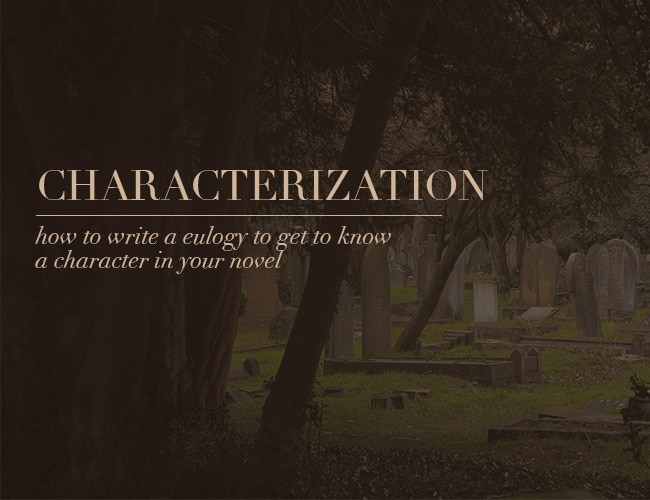Every great novel has great characters. Great characterization includes a background, flaws, habits, tics, and redeeming qualities. The characters have a life.

One of the hardest things to do when writing a novel is to come up with realistic, multi-dimensional characters your readers love (or love to hate). You want your readers to care about your characters, to cry with them, to laugh with them, and to root for or against them. Good characterization is what keeps your readers engaged with your book.
There are plenty of ways to get inside your character’s head. You can journal from their point of view, write a character study, or fill out questionnaires about your character. Those methods are awesome but can seem impersonal or just plain tedious at times.
If you need a quicker, more succinct way of getting inside your character’s head, you might consider writing their eulogy.
Characterization Prompt: Write a Eulogy
A eulogy is a speech given at memorial services to honor the deceased. It sums up and celebrates their life. Writing a eulogy is a great (and fun) way of getting inside your character’s head. It works especially well with villains, forcing you to focus on their entire life and not just the evil parts of their character.
When writing your character eulogy, you don’t want to simply focus on the basics of their life. That would defeat the purpose of attempting to delve further into your character’s psyche. Here are some things to think about to get your eulogy moving in the right direction:
Who’s giving the eulogy?
Is it a family member, a lover, a friend, the local librarian? Who’s delivering the speech can say a lot about the character.
If you really want a challenge, have the protagonist give the speech to honor the antagonist or vice versa. This not only gives you character development for the deceased but also fleshes out the relationship between rivals.
Don’t just focus on the large events of their life
Eulogies often have anecdotes, inside jokes, and memories. They’re not likely to tout the evil empire your villain ran and aren’t likely to focus solely on the millions of people your hero saved.
Remember your character wasn’t always who they are today. A mother might tell a story of the first time your character fell in love. A rival might talk about how they were best friends with the deceased when they were children.
Think of the entire life, not just the life within the realm of your story.
Think of random things about your character
What was their favorite song? Did they like gardening? Did they have a collection of stamps or rocks or vintage ballerina shoes? Did they take their mother to church on Sundays even though they spent the week stealing precious jewels? Did they love the smell of cherries but couldn’t stand eating them?
These things provide layers to your characterization. You won’t necessarily use these small details in your writing, but you’ll know your character better, and how they would react in situations, because of them.
Your Character Summed Up
Eulogies make you think more deeply about your character than questionnaires, as you’re looking at the entire arc of a life instead of the present tastes of your character. They point out the inconsistencies of human nature, the cruel (and happy) twists of fate, and the events that bring us together.
In short, they give your character a life.
What is your preferred method for exploring your characters? Have you ever tried writing a character eulogy? Let me know in the comments!
PRACTICE
Today I want you to spend fifteen minutes writing a eulogy for a character. It can be a character of your own creation or a character from a book on your shelf.
Then share your eulogy in the comments and give your fellow writers some feedback!
The post Characterization: How to Write a Eulogy to Get to Know a Character in Your Novel appeared first on The Write Practice.
from The Write Practice https://ift.tt/2NQpJvV
No comments:
Post a Comment